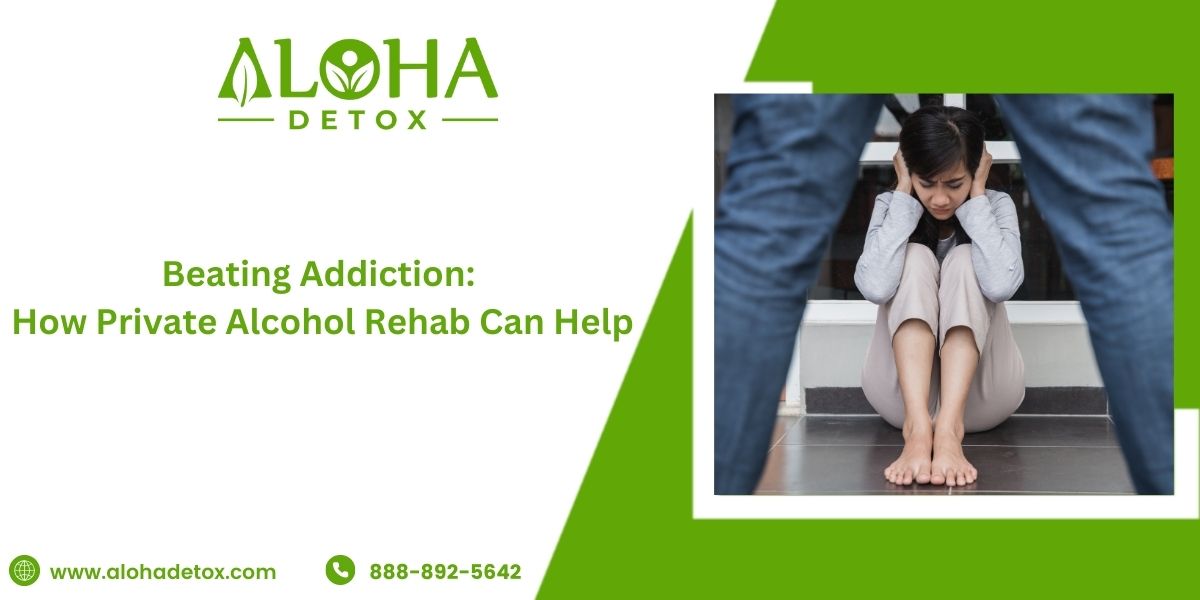
Beating Addiction: How Private Alcohol Rehab Can Help
Alcohol addiction is a very complex issue that affects millions across the world. For individuals suffering from this crippling disorder, finding ways to recover may become very elusive. Aloha Detox is an advanced facility in the sphere of substance abuse treatment and presents a specialized solution with its Private Alcohol Rehab programs. This blog will show how private alcohol rehab can provide a tailored, effective way to beat addiction by focusing on personal care, professional support, and long-term success.
Understanding Alcohol Addiction
Alcohol addiction, or alcoholism, is a chronic disease characterized by the inability to control drinking despite its harmful consequences. Physical dependence can include a physical craving for alcohol, whereas psychological dependence may make a person believe they cannot function or enjoy life without the substance. In reality, long-term alcohol addiction can indeed destroy a person’s physical health, mental well-being, relationships, and quality of life.
Realizing that professional help is needed will be the best decision for achieving recovery. While there are opportunities provided for public treatment, most affected individuals and their families opt for private alcohol rehab due to their very customized and holistic approach to recovery from addiction.
Why Choose Private Alcohol Rehab?
1. Personalized Treatment Plans
Perhaps the major benefit associated with private alcohol rehab is that treatment programs at this facility are tailored based on individual clients’ needs. At Aloha Detox, planning for treatment normally starts with a comprehensive assessment of the patient’s current physical and psychological condition. This helps the medical team draft proper treatment plans to address specific challenges or triggers that might have led to addiction.
Be it detoxification, counseling, therapy sessions, or holistic practices, the personalized care taken in a private rehab setting ensures that every bit of the recovery journey is tailored according to the patient. This greatly enhances the potential and probability of long-term recovery.
2. Professional and Confidential Care
Another critical benefit associated with private alcohol rehab concerns the level of confidentiality and professionalism accorded to patients. Most often, privacy is one of the major concerns for people who need treatment for their addictions; addiction can be stigmatizing, and many will not seek treatment because of this. Indeed, all personal and treatment information concerning a patient is kept strictly confidential in allotting privacy protection at private facilities such as Aloha Detox.
Besides privacy, private rehabs offer access to highly trained personnel specializing in treating people with addiction. Experts include doctors, therapists, and counselors who work together to provide adequate care. Their level of expertise, coupled with their experience, gives them the vantage point they need to handle complicated cases of addiction with the required care and attention for effective recovery.
3. Holistic and Therapeutic Approaches
Private alcohol rehabilitation facilities can usually offer more treatment options than those provided by public programs. For example, Aloha Detox offers treatment plans that include yoga, meditation, and art therapy, besides nutrition counseling—holistic practices that help individuals find better balance within themselves and achieve internal peace while fighting to recover.
More common therapeutic modalities in private rehabs include cognitive-behavioral therapy and dialectical behavior therapy. Such evidence-based therapies help patients identify and change negative thoughts occurring with the behaviors that perpetuate addictive behaviors. By combining traditional and holistic therapies, private alcohol rehab can provide a well-rounded treatment experience that enables healing to happen on many different levels.
Long-Term Success and Support
Recovering from alcohol addiction is a lifelong process that will not stop once a patient starts to leave the rehab area. Indeed, Aloha Detox values the role of aftercare and continued support. The programs address the needs of transitioning individuals back into daily life by continuing therapy, support groups, and follow-ups regularly with a counselor.
The private rehab-supportive atmosphere continues but goes all the way to making sure that these patients have what it takes to live sober. This is so important—being committed to long-term success—a characteristic that truly defines private alcohol rehab and accounts for its effectiveness in helping many recover for a lifetime.
Conclusion
Alcohol addiction is a serious condition that does require professional intervention and, in most cases, a tailored approach. Private alcohol rehab is a personal and confidential route to recovery, making it the best option for people who are struggling to break free from addiction.
Aloha Detox arises in this field to extend to an individual their expertise, care, and support in reclaiming life and taking up a future without alcohol dependence. By opting for private alcohol rehabilitation, what a client is doing is putting a life-changing investment within their fingertips—dashing hope onto a healing journey that radiates prospects for a better tomorrow.
